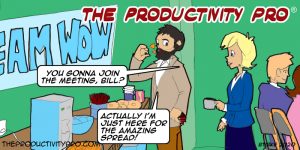
“The reward for work well done is the opportunity to do more."—Jonas Salk, the inventor of the polio vaccine. We all perform our work tasks at different rates of speed. What might take one person eight hours might take another four, due to experience, training, focus, automation, or systems. And therein lies one of the biggest issues at the heart of the standard modern business model — one that has increased annual productivity on the one hand and stalled it on the other. Until recently, the productivity increase has outweighed the slowdown; however, that’s becoming less true as time goes on. Have you ever finished your tasks and meetings for the day, double-checked everything, and then found yourself with nothing urgently due? Many of us have. Sure, you could start on some other … [Read more...]











